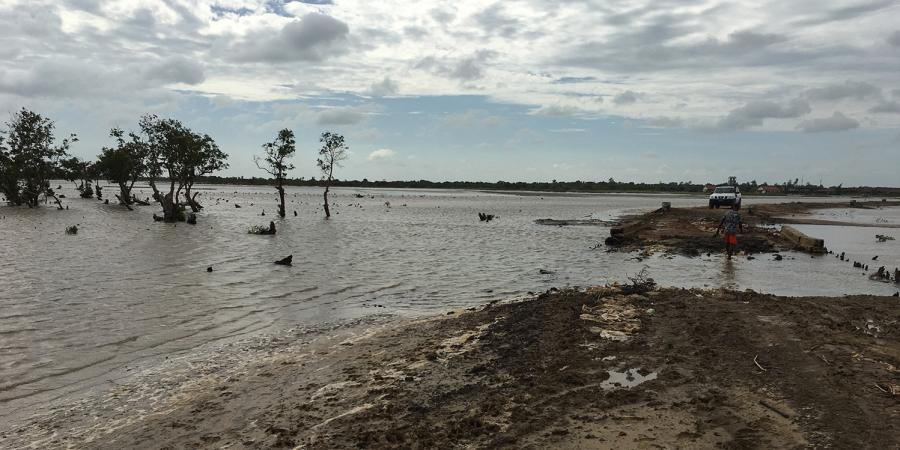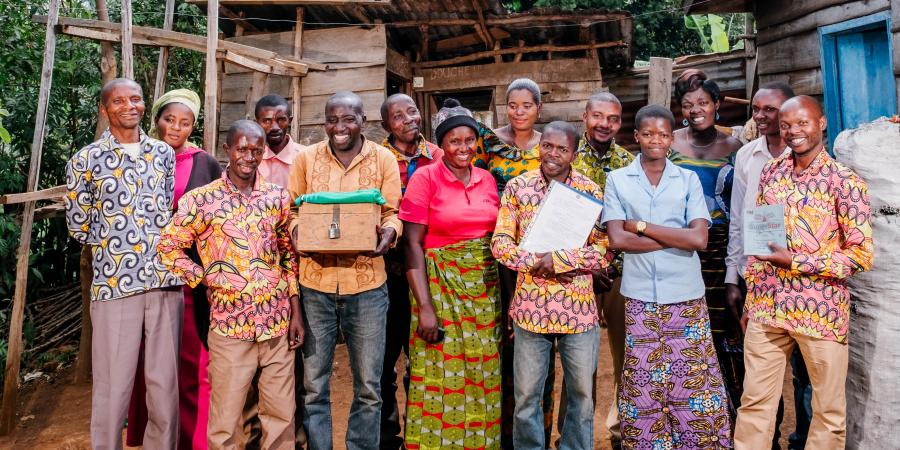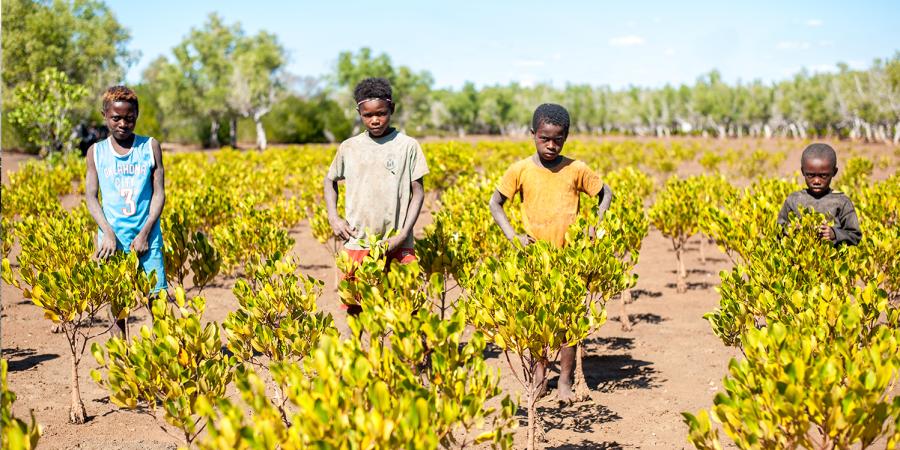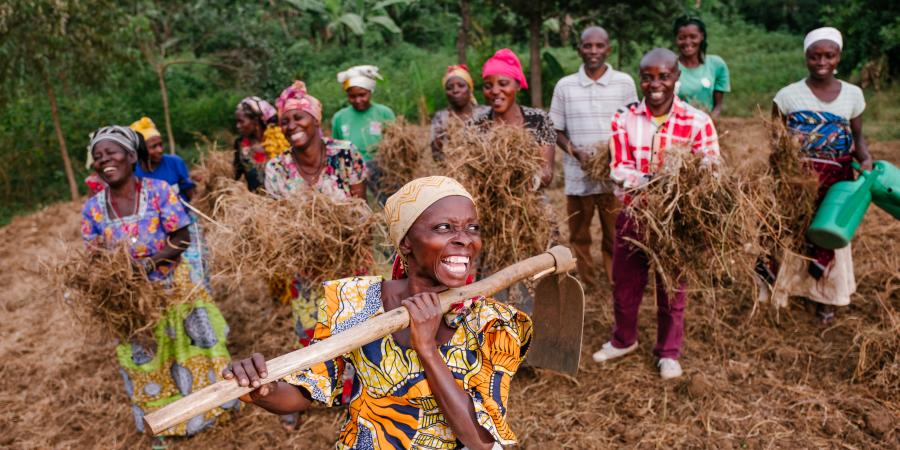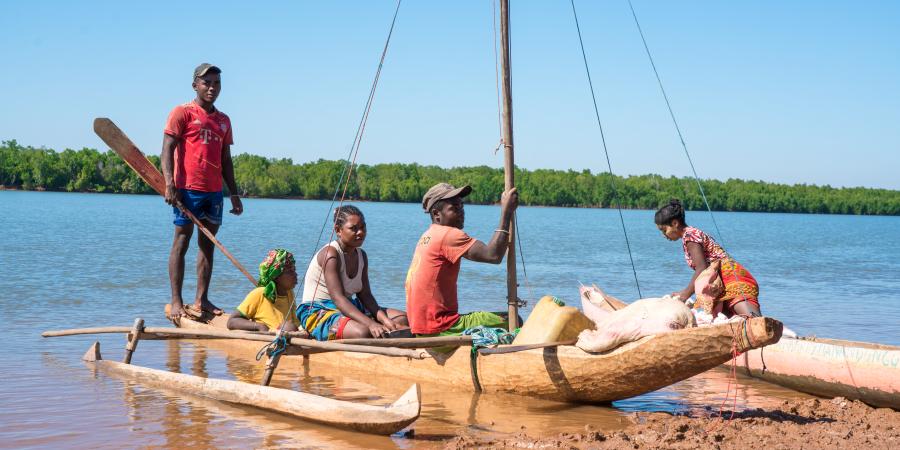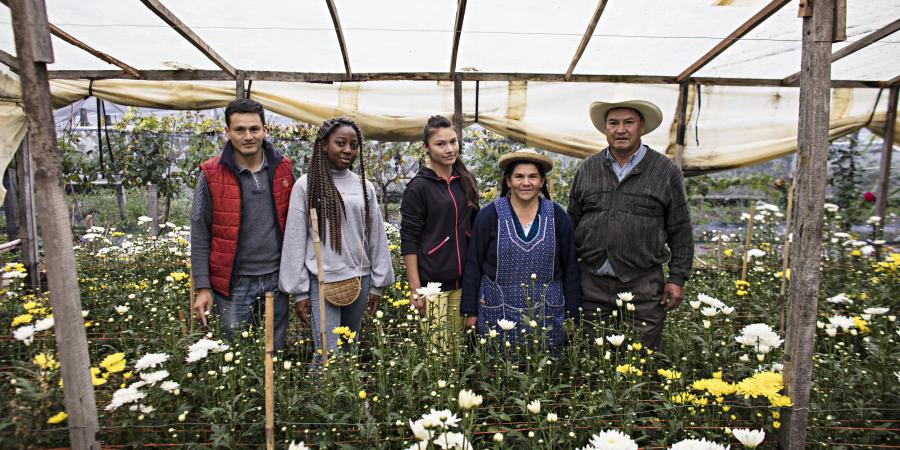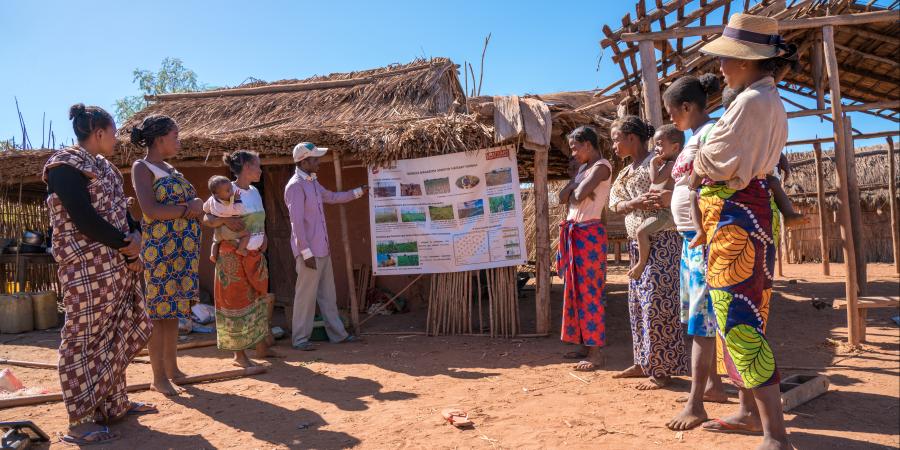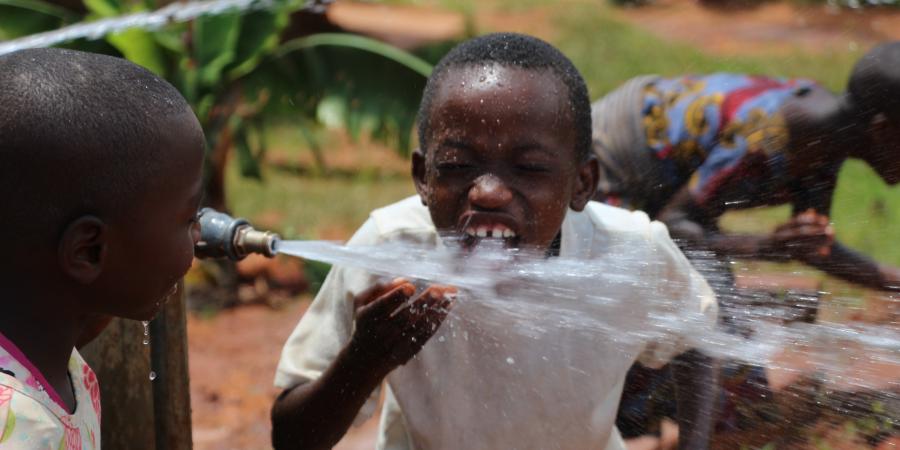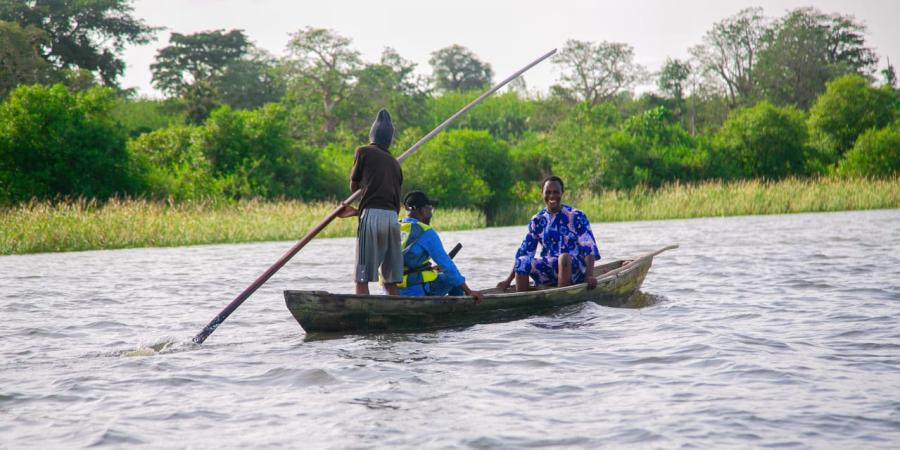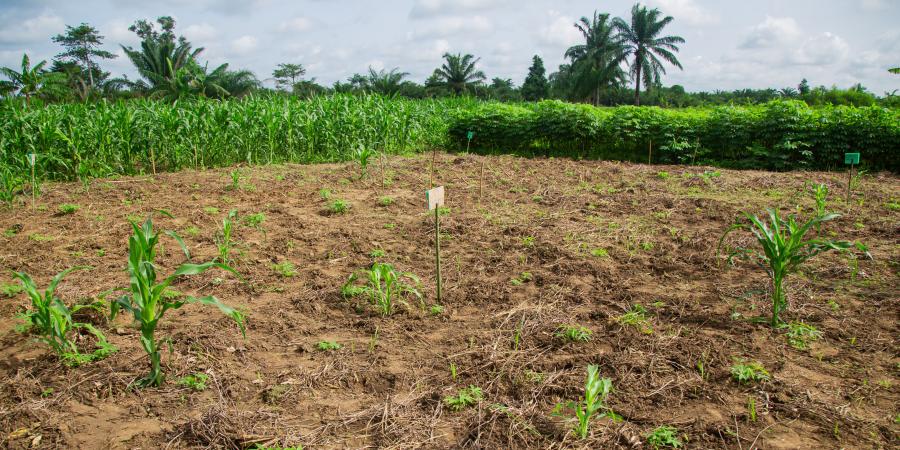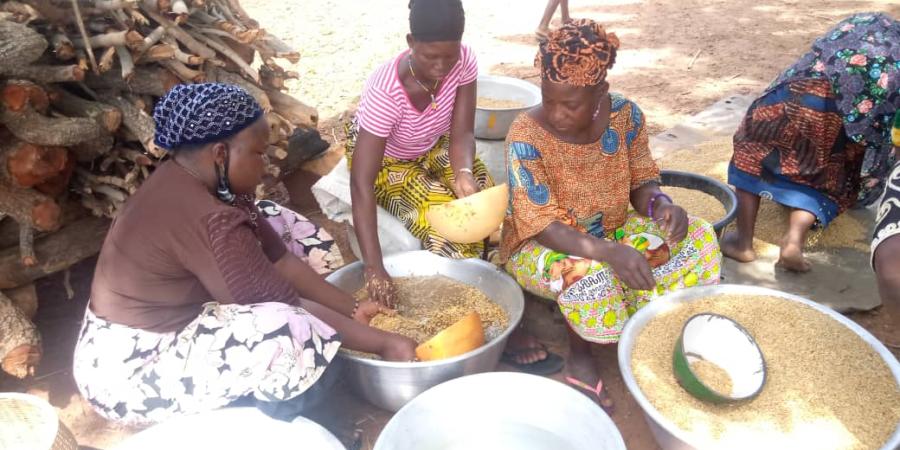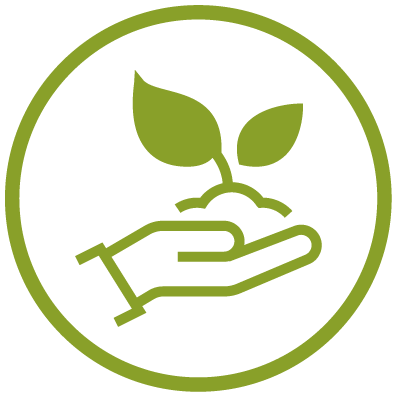
Sustainable Food Systems
Working towards sustainable food systems
Louvain Coopération works towards sustainable food systems that guarantee food and nutritional security while preserving ecosystems and resilience to climate change.
These systems encompass all actors and activities related to the production, processing, distribution, preparation and consumption of food, including socio-economic activities and the resulting environmental impacts.
Louvain Coopération identifies levers for change at each stage of the value chain in order to strengthen local dynamics, encourage sustainable and fair agricultural practices, and promote healthy and accessible food for all.
Value chains, agroecology, natural resources
The development of sustainable food systems requires taking into account a whole range of factors, activities and actors. Our work focuses on several of these factors:
- Transition to agroecology
- Protection of natural resources and enhancement of ecosystem services
- Sustainable development of value chains
- Improvement of livelihoods
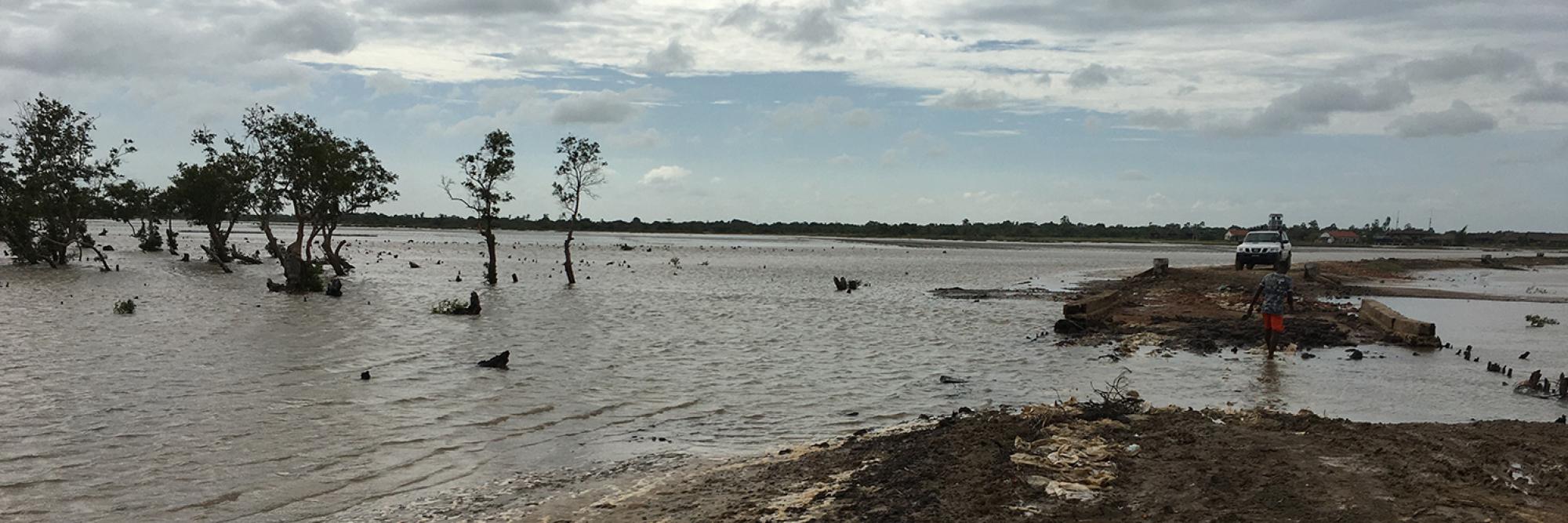
Madagascar
Coordination of coastal resilience activities in Morondava
- Project duration: 2025 - 2027
Our Objective
To strengthen the climate resilience of Morondava communities in the face of coastal erosion and flooding through integrated and sustainable coastal zone management.
Our Actions
- Training local stakeholders in integrated coastal zone management (ICZM), climate change adaptation and sustainable natural resource management
- Promoting participatory management of coastal areas with the involvement of local authorities, NGOs and communities
- Strengthening natural defences against erosion (dunes, mangroves)
- Rehabilitation of the Hellot Canal to improve runoff management and prevent flooding
- Raising awareness among communities, particularly young people, of environmental issues and climate resilience
- Development of sustainable and replicable management models for other coastal regions of Madagascar and the Indian Ocean islands
Our Impact
This project contributes to better coastal protection, improves the resilience of populations to climate risks and offers sustainable solutions that can be transferred to other coastal contexts.
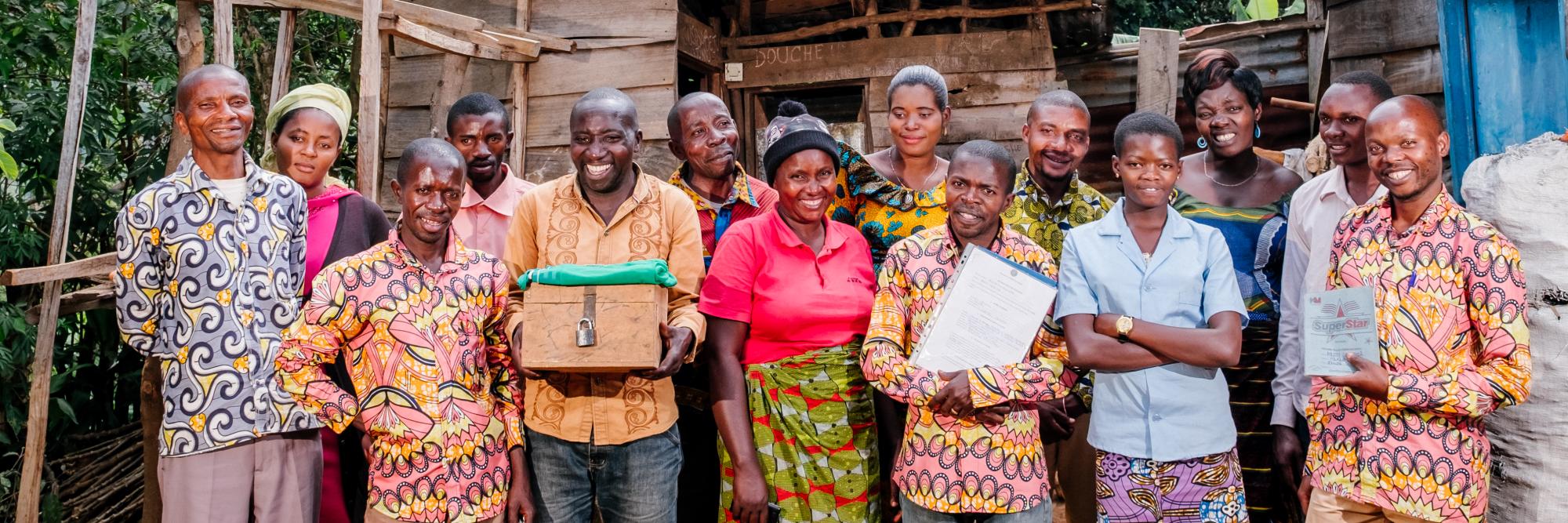
RDC
Facilitating local initiatives in the DRC
- Project duration: 2023-2026
Our objective:
To strengthen the capacities of civil society organisations (CSOs) in the DRC to promote a more inclusive and participatory democratic space. The project supports initiatives in the areas of governance, human development and sustainable development.
Our actions
- Establishment of the Local Initiative Support Service (SAIL), a resource centre for CSOs in the 26 provinces of the DRC;
- Training and support for 120 microprojects across the country;
- Funding for local microprojects up to €60,000 for a maximum duration of 12 months each;
- Support for concrete initiatives on a variety of themes:
- Peacebuilding (Western Kasai)
- Literacy and integration of young people (Kinshasa)
- Care for street children (Kinshasa)
- Detection of complications related to sickle cell anaemia (Kinshasa)
- Cultural promotion: jazz and piano festivals (Kinshasa)
- Expansion of hospital maternity wards (Kisenso)
- Economic resilience of women in mining areas (Ituri)
- Agribusiness for young people (Central Kongo)
- Food security and access to water (Kwilu)
- Urban sanitation and environmental education (Kinshasa)
- Youth engagement on climate change (North Kivu)
- Participatory land governance (South Kivu)
Our Impact:
This project helps to revitalise Congolese civil society in all provinces by promoting local initiatives. It strengthens participatory governance, improves access to fundamental rights and gives a voice to grassroots actors, particularly young people and women.
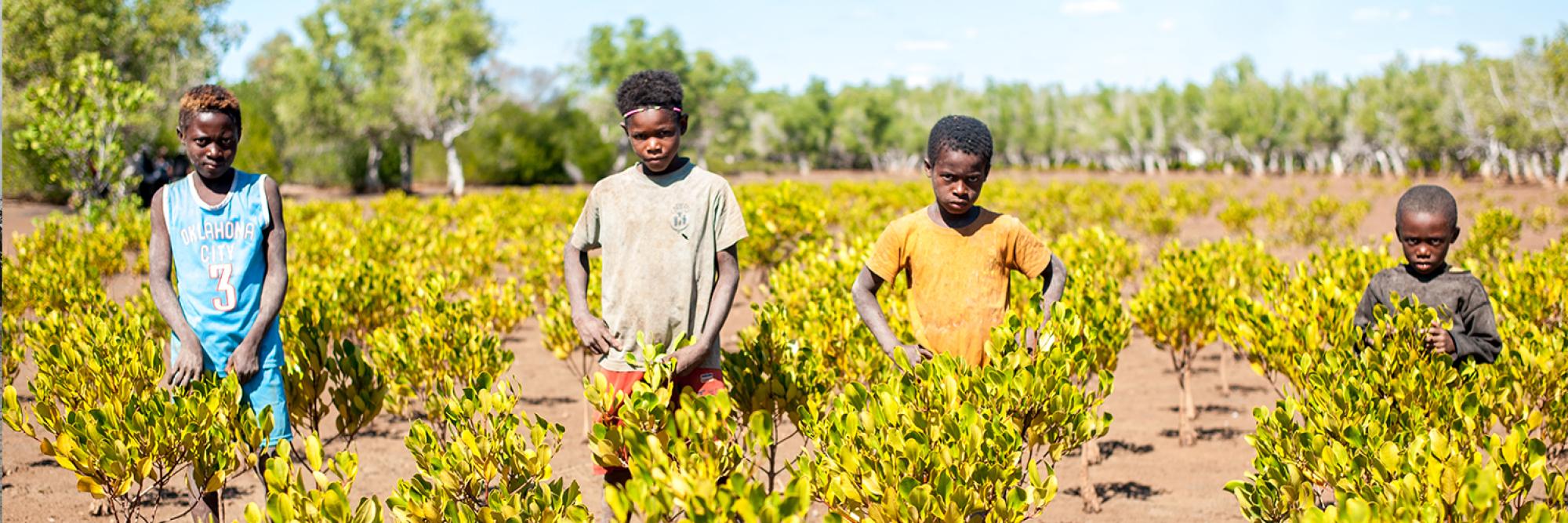
Madagascar
Our aim is to ensure the sustainable management of natural resources, particularly mangrove areas, by working to protect biodiversity, safeguard ecosystem services and promote socio-ecological resilience, with the involvement of local authorities and communities. A great deal of thought is being given to this issue within our consortium of university NGOs, Uni4Coop.
To achieve this, together with our local partners, we are working to improve the governance of mangrove areas, through advocacy in favour of these ecosystems, as well as raising local awareness of regulations.
To strengthen shared knowledge in this area, awareness-raising campaigns on ecosystem development and management plans and environmental education in schools are being set up. We also organise consultation and knowledge-sharing sessions on the proper management of ecosystems. Access to this knowledge requires the ability to read and write. Functional literacy and consciousness-raising courses are therefore offered to adults who have not had the chance to go to school.
To encourage the sustainable use of mangroves, we are working to improve the incomes and living conditions of the people living in these areas. This involves supporting sustainable economic activities that do not destroy the ecosystem, setting up and developing group savings schemes, and supporting fishermen's cooperatives. We also organise exchange visits on mangroves and open days in these areas.
Finally, to encourage the conservation and restoration of mangrove areas, we have set up a "green fund" to support local initiatives. We are also distributing a toolkit of best practices and promoting an economic model that reconciles exploitation and conservation.
Partners : FIVOI, FIAME, OPCI Alokaina, FIDEV, ALEFA MENABE, DRPEB (Direction régionale de la Pêche et de l’Economie bleue) et DREDD (Direction régionale de l’Environnement et du Développement Durable).
Cambodge
Partnership for Agroecology Transition, Networking and Efficient Resilience (PArTNER)
Our objective
The PArTNER project aims to strengthen the economic and social resilience of rural Cambodian families by accelerating the agroecological transition, structuring sustainable value chains and promoting inclusive governance in which women play a central role. The objective is to enable small-scale producers to access decent incomes, lucrative markets and greater participation in decision-making.
Our actions
- Development of sustainable agricultural systems through a farmer-to-farmer extension system led by farmers specialising in training, agroecological experimentation and practices related to SRP rice, seeds, bokashi, vegetables and livestock farming.
- Strengthening agricultural cooperatives and their unions through support in administration, finance, governance and planning to improve their autonomy and efficiency.
- Supporting agroecological value chains in management, marketing, business development and standards improvement.
- Supporting farmers' organisations to represent producers in dialogues with the private sector and authorities, and promoting policies that favour smallholder farmers.
- Promoting female leadership and supporting women's entrepreneurship through training in decision-making, advocacy and the development of income-generating activities.
- Raising awareness among urban consumers about healthy eating, producing videos and educational content, and creating commercial links between agroecological producers and markets.
- Networking agroecology stakeholders: training, exchange visits, workshops, dissemination of good practices and small grants programme for local initiatives.
Our impact
The project strengthens the economic resilience of rural families, accelerates the agroecological transition, increases the incomes of small-scale producers, and promotes the empowerment of women within agricultural organisations. It contributes to reducing chemical inputs, providing healthier food for consumers, and establishing sustainable and equitable value chains. Finally, it energises networks of actors committed to agroecological transition and influences public policy in favour of sustainable food systems in Cambodia.
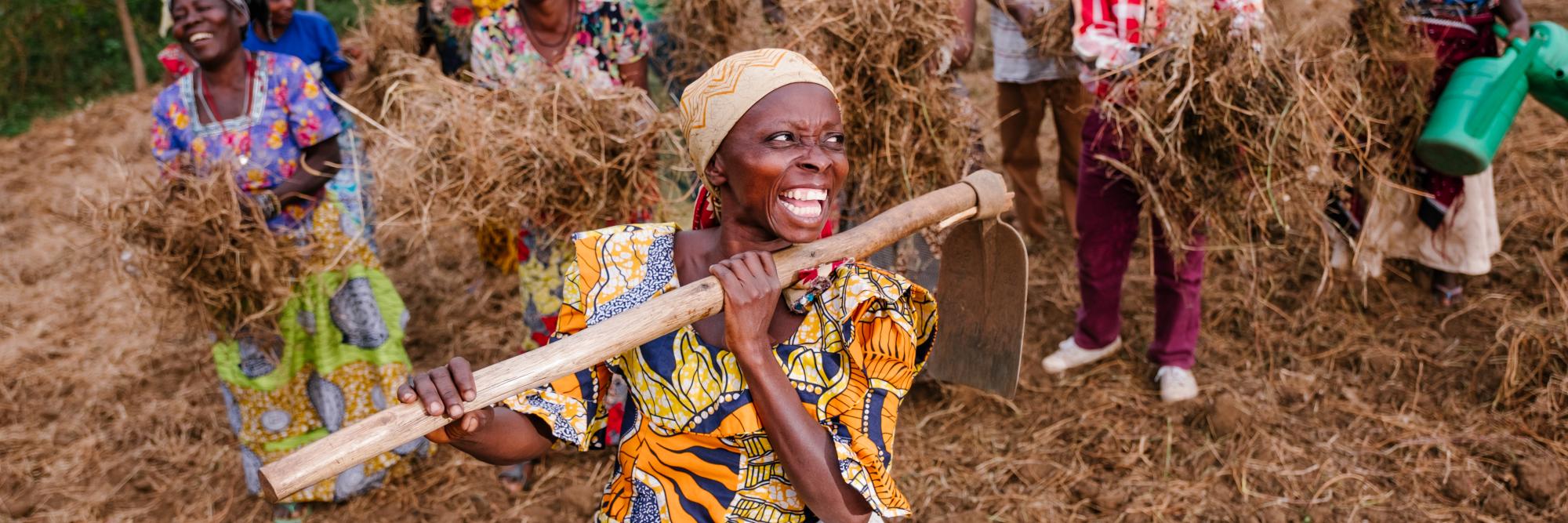
RDC
Promoting a Sustainable Food System
- Project duration: 2022 - 2026
Our Objective:
To promote sustainable and inclusive economic and agricultural models by working across the entire value chain. We promote agroecological practices, support entrepreneurship among young people and women, and strengthen the capacities of local partners for better natural resource management and greater socio-economic resilience.
Our Actions:
- Support for the adoption and appropriation of profitable agroecological practices adapted to local contexts;
- Strengthening the entrepreneurial skills of women and young people in innovative economic sectors;
- Literacy, particularly for women, to strengthen their autonomy and leadership;
- Professionalisation of economic activities through training and technical support;
- Promoting biodiversity conservation and the restoration of natural resources in agroecosystems;
- Close support for vulnerable young people to help them integrate into society and the labour market.
Our Impact:
This project strengthens the economic sovereignty of rural communities while preserving the environment. It promotes the empowerment of young people and women, encourages local innovation dynamics, and improves the resilience of ecosystems and populations to multiple crises.
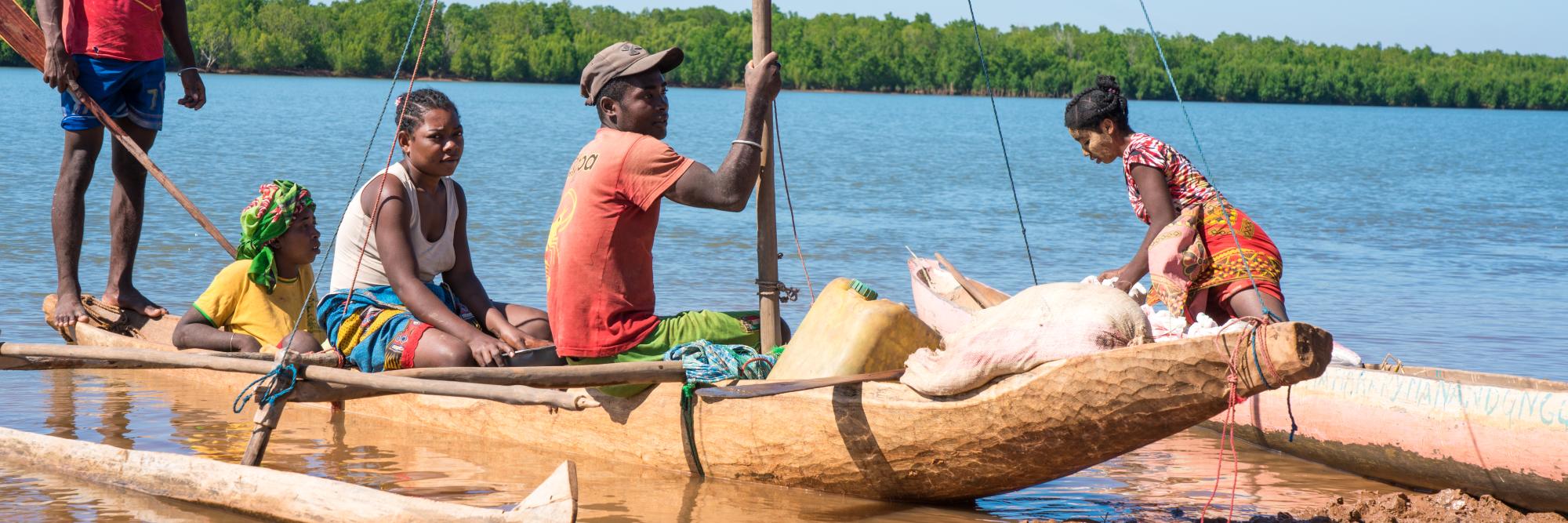
Madagascar
Promoting inclusive fishing in the mangroves of Menabe
- Project duration: 2022–2026
Our Objective
To ensure the sustainability of fishing areas located in the mangroves of the Menabe region by preserving natural resources and meeting the socio-economic needs of local communities.
Our Actions
- Conducting in-depth studies on fishery resources, including field surveys and catch monitoring to understand exploitation dynamics and species diversity;
- Collecting and analysing data to inform local policies and strengthen sustainable management of fishing areas;
- Promoting inclusive fisheries resource management, involving local communities in decision-making and governance;
- Identifying and supporting alternative economic activities (beekeeping, market gardening, etc.) to reduce pressure on mangrove ecosystems;
- Strengthening the protection of mangrove ecosystems through strategies adapted to the socio-economic realities of fishermen and the families who depend on them.
Our Impact
This project contributes to a better understanding of fishery resources and enables the development of more sustainable and inclusive fishing practices. It supports the diversification of local communities' livelihoods and promotes the long-term preservation of mangrove ecosystems, which are essential for the region's biodiversity and climate resilience.
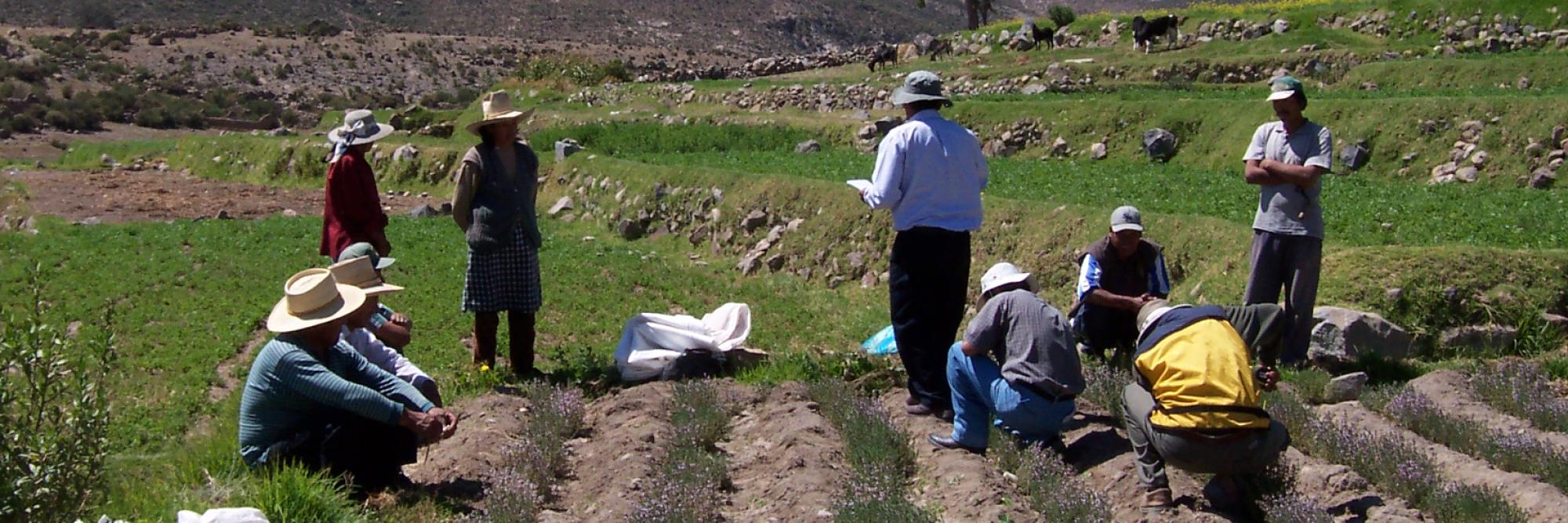
Pérou
Promoting sustainable food systems(ImpulSAD)
Our Objective
To develop and strengthen sustainable food systems and entrepreneurial dynamics within rural Peruvian communities, while improving access to food, natural, productive and environmental resources, as well as land and territory.
Our Actions
- Strengthening the resilience and environmental awareness of local actors through awareness-raising and the expansion of areas dedicated to environmental management (land use planning, sustainable management of natural resources).
- Agroecological transition for producers, including training, technical support and food diversification for women and farming families.
- Clean-up campaigns and reforestation activities in communal areas.
- Participation in research and experimentation on natural inputs to improve harvests.
- Support for green entrepreneurship and the structuring of cooperatives, through non-financial services to improve household incomes and strengthen local organisations.
- Development of sustainable small businesses, such as organic production, waste management or renewable energy, and promotion of short supply chains between rural producers and urban consumers.
- Economic, social and decision-making empowerment of women, with increased access to positions of responsibility in production units and better access to information and communication technologies.
Our impact
This project strengthens communities' adaptation to environmental challenges, improves food security and accelerates the agroecological transition. It also stimulates a sustainable rural economy through green entrepreneurship and contributes to women's autonomy in production, management and decision-making, thereby supporting more resilient and equitable territorial development.
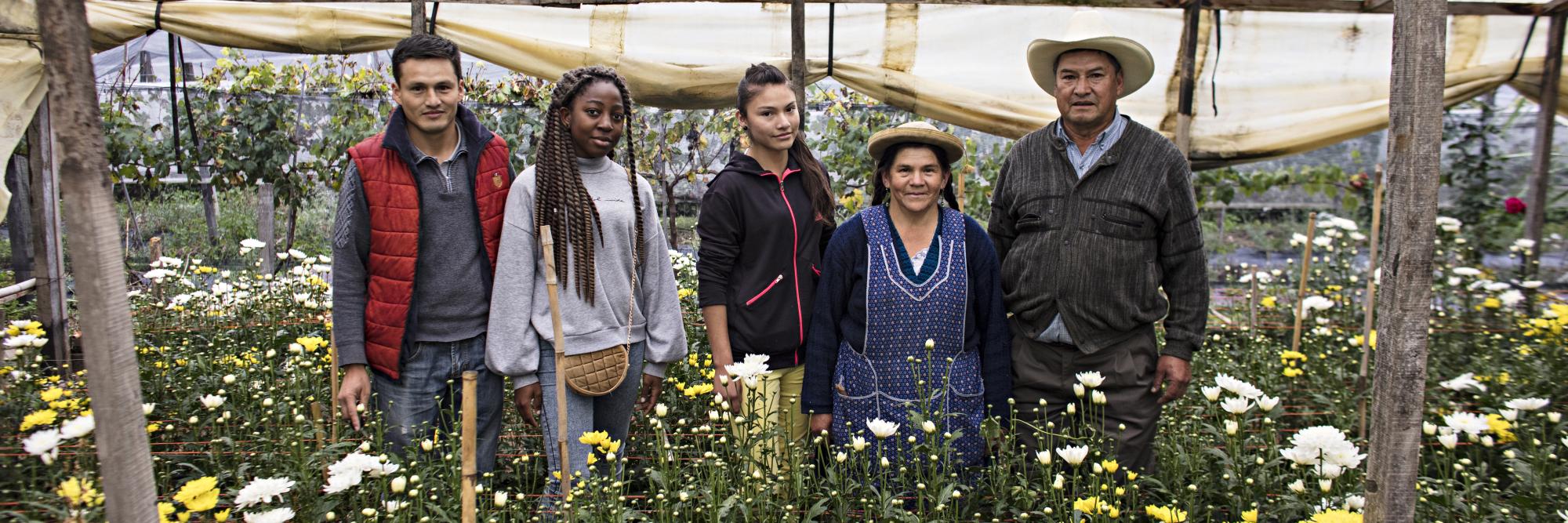
Bolivie
Promoting sustainable food systems
Our objective
To facilitate rural and peri-urban families' right to land, food and resources, while encouraging solidarity-based and sustainable entrepreneurial initiatives that serve communities and the environment.
Our actions:
- Technical and organisational support for producers, organisations, platforms and agricultural networks;
- Training and field assistance to support the agroecological transition of production systems;
- Raising awareness of a diversified diet in rural areas and in schools;
- Sustainable management of natural resources and strengthening resilience to climate change;
- OIE approach: monitoring of self-defined commitments to environmentally friendly agricultural practices;
- Support for economic initiatives (agricultural and non-agricultural) by strengthening production and marketing capacities;
- Promotion of short supply chains to bring producers and consumers closer together;
- Entrepreneurial training for women, aimed at economic autonomy, self-confidence and leadership;
- Integration of ICTs into production and marketing systems.
Our impact
This project contributes to improving food security, income and empowerment for rural families, while strengthening environmental sustainability and gender equality.
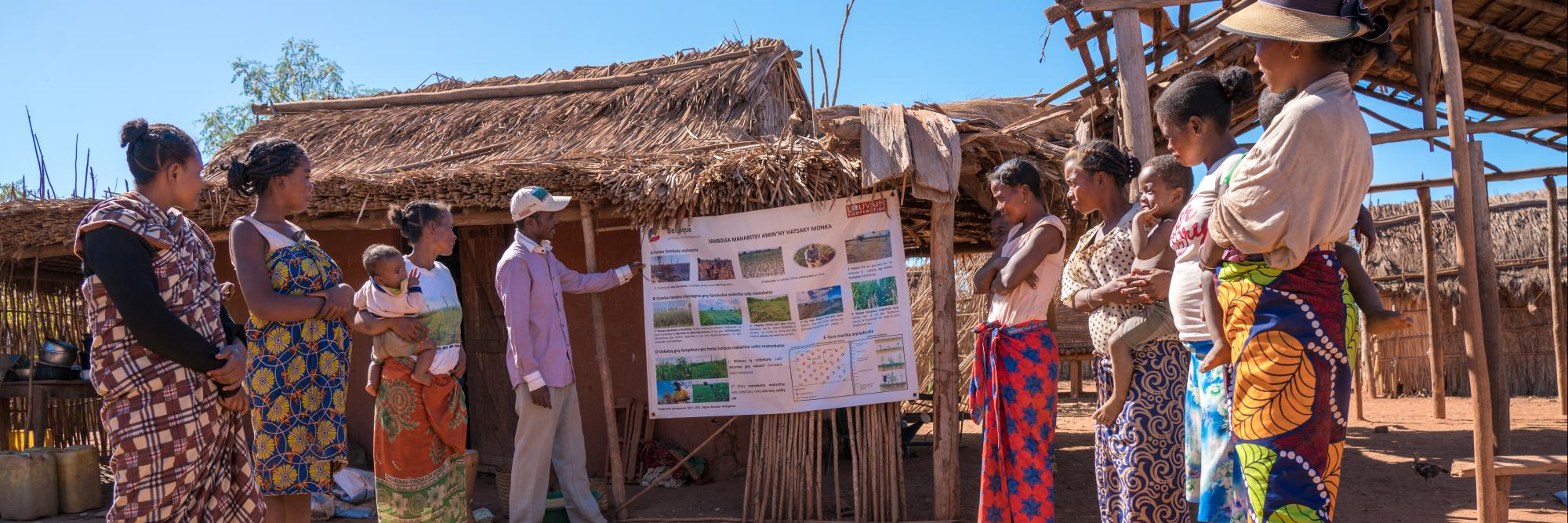
Madagascar
Support for a sustainable food system
- Project duration: 2022–2026
Our Objective
To improve the resilience of rural communities in the Menabe region to the effects of climate change and strengthen their economic autonomy and transition to sustainable and agroecological agriculture.
Our actions
- Technical support for agroecological production and sustainable farm management
- Support for agricultural and food diversification, with easier access to agricultural inputs
- Support for the development of commercial channels and the processing of agricultural products to increase local added value
- Promotion of agroforestry and reforestation to limit erosion and improve soil quality
- Establishment of income-generating activities for rural households
- Structuring and supporting farmers' organisations for better representation with regional and national authorities
- Raising awareness of climate change among rural communities and using the Environmental Integration Tool (OIE) to promote more resilient and sustainable agriculture
Our Impact
This project helps improve food security, economic autonomy and the resilience of farmers to drought and erosion. It promotes sustainable local agriculture and supports the structuring of farmers' organisations so that they can better defend their interests and influence local and regional decisions.
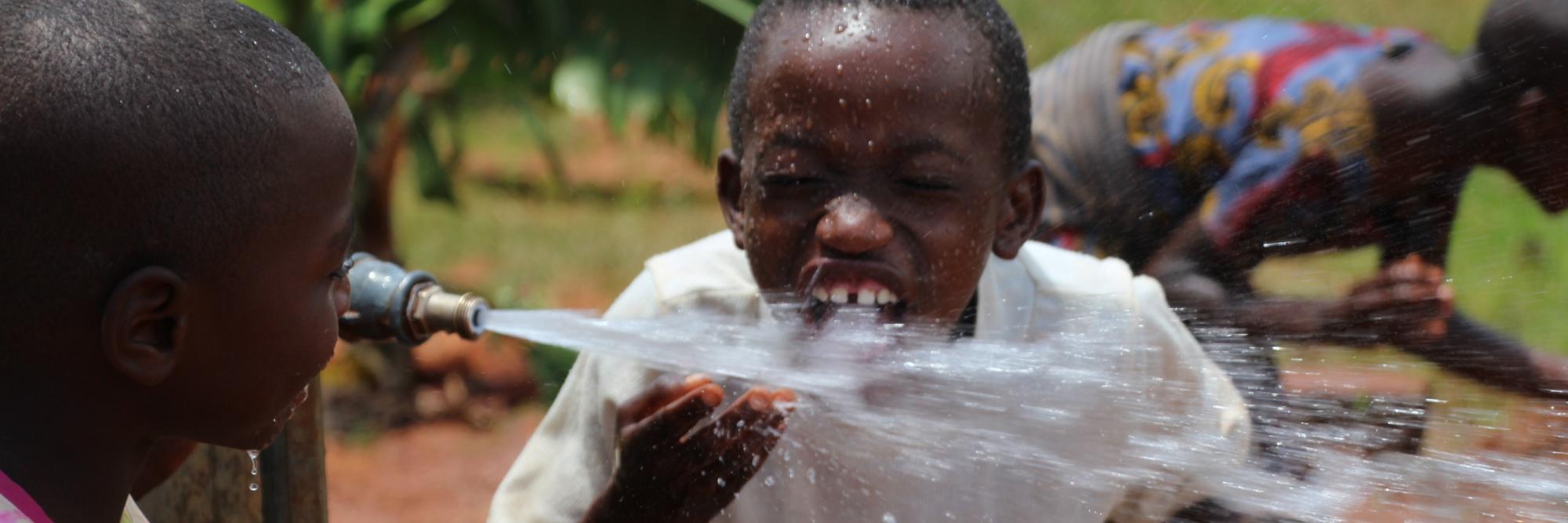
Burundi
Support for civil society active in the fields of the environment and biodiversity
- Project name: PASCALE B IBIDUKIKIJE
- Project duration: 2022 - 2026
Our Objective:
To influence public policy on the environment by strengthening civil society organisations (CSOs) for the sustainable management of natural resources and biodiversity through the implementation of local, participatory and environmentally friendly projects.
Our Actions:
- Strengthening and structuring 80 organisations active in the fields of the environment and biodiversity.
- Training on natural resource management, agroforestry, ecological land use planning, sanitation, biodiversity, etc.
- Creation of networks and spaces for multi-stakeholder dialogue.
- Support and financing for 16 micro-projects led by CSOs (reforestation, restoration of flora with native species, protection of sensitive areas, improved access to drinking water, etc.).
- Advocacy with local and provincial authorities.
- Support for community management of environmental infrastructure.
- Awareness campaigns to encourage environmentally friendly practices.
Our impact:
This project enables local stakeholders to be better trained, more committed and better organised to protect their environment.
Burundi
Support for entrepreneurship in the agricultural sector
- Project name: SESA-UMWUMBATI WACU
- Project duration: 2023-2027
Our objective:
To support 9,265 micro, small and medium-sized enterprises working in the production, processing and marketing of agricultural products in the cassava sector.
Our actions:
- Production and provision of quality seeds through support for seed producers.
- Training in agroecological practices for producers, seed producers and 53 producer organisations.
- Integration of livestock farming into family farms to diversify production and facilitate access to natural fertilisers.
- Development of processing units to diversify processed products while making use of agricultural waste.
- Facilitating access to finance through banks and microfinance institutions for rural businesses.
- Functional literacy focused on rural economic activities, particularly for women and marginalised groups to strengthen their autonomy.
- Promoting human rights and decent work through awareness-raising and popular education initiatives.
- Educational activities on the environment and the green economy to encourage responsible and sustainable behaviour.
Our impact:
This project helps to sustainably strengthen the economic capacities of thousands of rural actors involved in the cassava sector, while promoting social inclusion and autonomy for the most vulnerable. Thanks to an integrated approach, it contributes to more resilient, equitable and environmentally friendly agriculture.
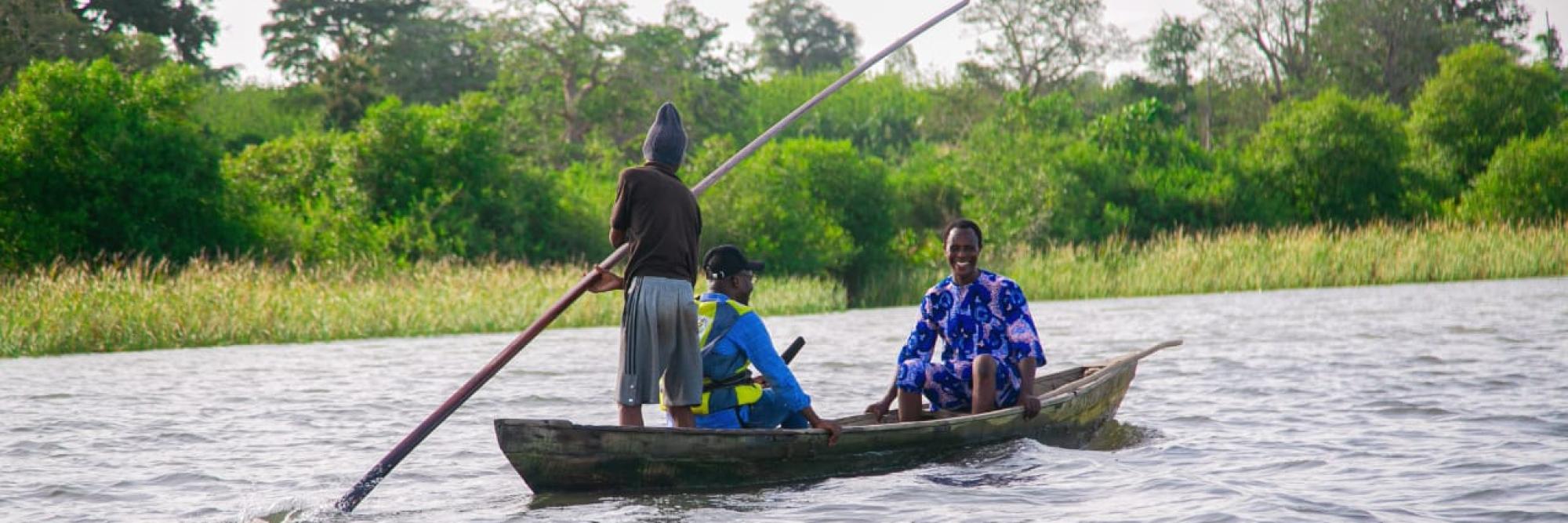
Benin
Sustainable management of natural resources and mangroves
Our Objective
To ensure the protection and sustainable management of mangrove ecosystems while improving the living conditions of local communities through sustainable economic alternatives.
Our Actions
- Raising awareness among local communities about sustainable management of mangroves and natural resources.
- Training local stakeholders in regulations, waterway restoration and environmental management.
- Carrying out mangrove reforestation and maintenance activities.
- Developing sustainable economic sectors (e.g. market gardening, salt production, oyster farming, etc.) and alternative energy sources to reduce pressure on ecosystems.
- Participating in consultation frameworks and supporting mangrove governance authorities.
Our impact
This project contributes to the preservation of mangrove ecosystems, strengthens the resilience of local communities and promotes sustainable and inclusive natural resource management practices.
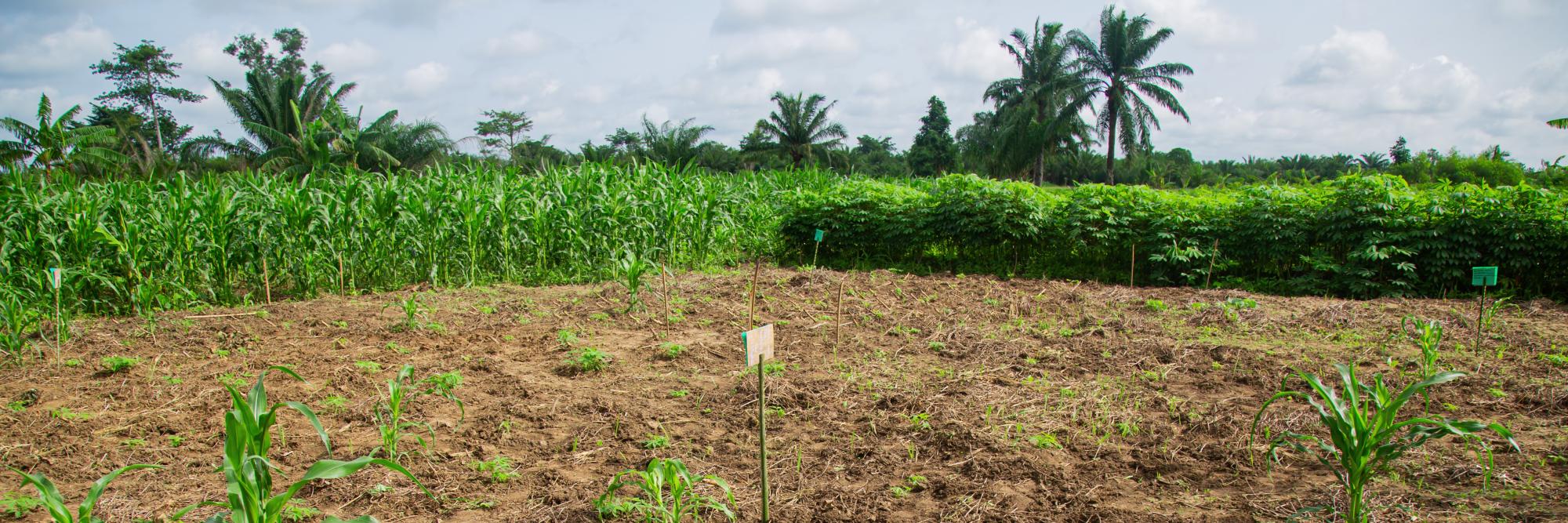
Benin
Sustainable management of the Mono Delta biosphere
Our objective
To improve the incomes of cassava producers in the Mono Delta Biosphere Reserve through a sustainable, environmentally friendly supply chain that benefits local communities.
Our Actions
- Training in agroecology for sustainable agricultural practices.
- Creation of mutual aid and training groups (communities of practice and learning).
- Establishment of farmer training fields to test and disseminate agricultural innovations.
- Facilitated access to improved seeds, biofertilisers and biopesticides.
- Strengthening of local organisations of cassava producers and processors.
- Support for women's cooperatives for the processing and promotion of cassava products.
- Development of local sales channels (restaurants, hotels, local shops).
- Strengthening of partnerships with local institutions and agricultural services.
- Promotion of contractualisation and formalisation of commercial exchanges.
Our Impact
This project improves the incomes of cassava producers, advances agroecological transition, and promotes the development of sustainable and inclusive local markets.
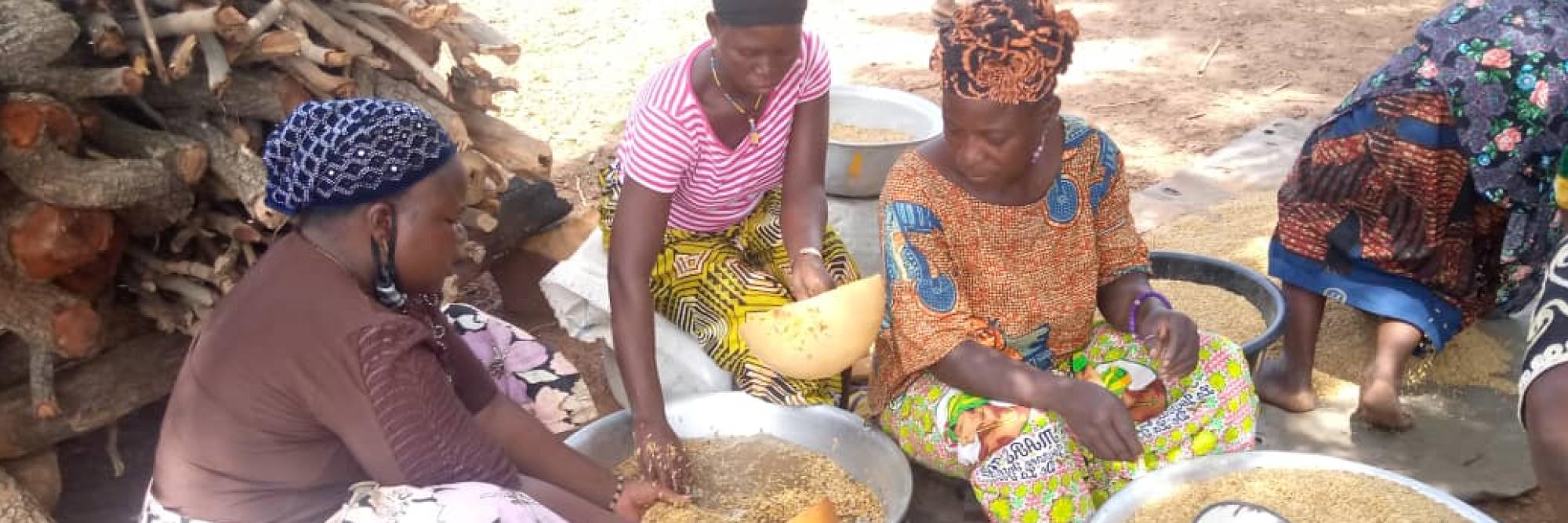
Togo
Transition to sustainable and inclusive food systems
- Project duration : 2022-2026
Our objective:
To support agricultural entrepreneurs and rural communities in the Savanes Region in their transition to sustainable food systems. This involves strengthening their individual and collective capacities to enable them to fully exercise their economic, social, cultural and environmental rights, while integrating gender equality at the heart of every action.
Our actions
- Training for agricultural entrepreneurs and producers to strengthen technical skills and promote sustainable farm management;
- Practical workshops on innovative marketing and food hygiene;
- Integration of livestock farming into agriculture;
- Deployment and strengthening of the Participatory Guarantee System (PGS) for the certification of locally produced agroecological products;
- Creation of an online platform, EcoAgriMarket, for the sale of local agroecological products;
- Assessment and support for the agroecological transition of around 100 farms;
- Implementation of a literacy programme using the Reflect method (Regenerated Freirean Literacy through Community Techniques) comprising eight literacy centres, mainly for women;
- Facilitation of community reading, writing and listening clubs.
Our impact
This project enables agricultural producers and entrepreneurs to strengthen their skills, increase their incomes and better promote their products, while promoting the economic inclusion of women and the resilience of rural communities.

